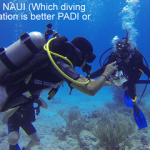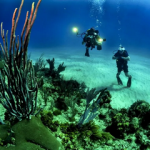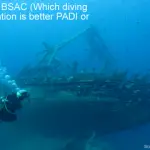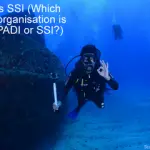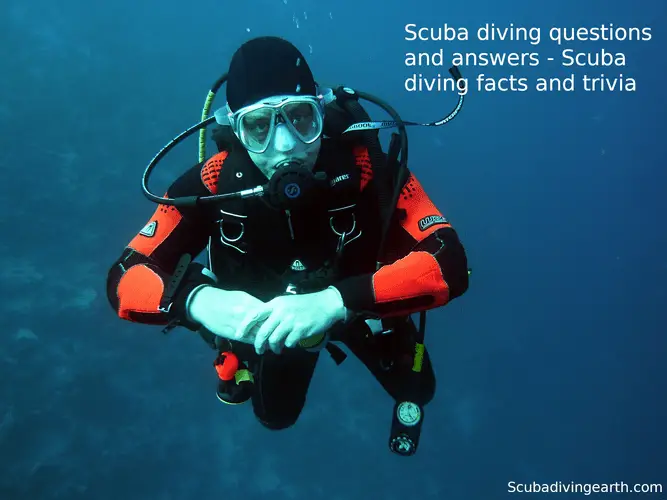
A list of questions to ask a scuba diver and scuba diving facts and trivia
The are many Scuba diving questions and answers, many of which are answered in this article. These may help you prepare questions to ask a scuba diver in readiness to learn to dive. Or you may be preparing for a quiz night in the pub.
Scuba diving questions and answers that are commonly asked by non-divers and beginner scuba divers. These include questions like:
- Is it hard to learn to scuba dive?
- Can a non-swimmer go scuba diving?
- Can you scuba dive without being certified?
- How to get certified?
Plus many more scuba diving questions and answers.
The best way to do more diving is to book yourself on a scuba diving liveaboard. You can check the latest and best deals on liveaboards using the following window:
Common questions asked by non-divers about scuba diving
There are many scuba diving questions asked by non-divers, but also by scuba diver beginners too. This article covers these questions together with the answers, as follows:
Is it hard to learn to scuba dive?
As far as active recreational hobbies or pastimes go scuba diving is one of the easiest to learn. There are a few very important rules to learn scuba diving at the outset. Which include not holding your breath underwater. But also to understand the impact of depth and pressure underwater and decompression.
Although when I taught scuba, certain students found different aspects harder than others. For example, many beginner scuba divers struggled with mask clearing. But if you’re already a swimmer or even better an avid snorkeler learning to scuba dive will be fairly straight forward.
This neatly leads to the next scuba diving question and answer.
Can a non swimmer go scuba diving?
In theory yes you could, but it’s not advisable to scuba dive without knowing how to swim. Both PADI and BSAC require a minimum swimming ability of 200 metres (656 feet) of a swimming pool.
This swimming test can be done using any stroke you like. This can be breast stroke, the crawl of whatever else. You will also need to be able to tread water too. If you can swim treading water should be very easy for you too.
Knowing how to swim before you learn to scuba dive is for your own safety. But is also for the safety of other scuba divers with you.
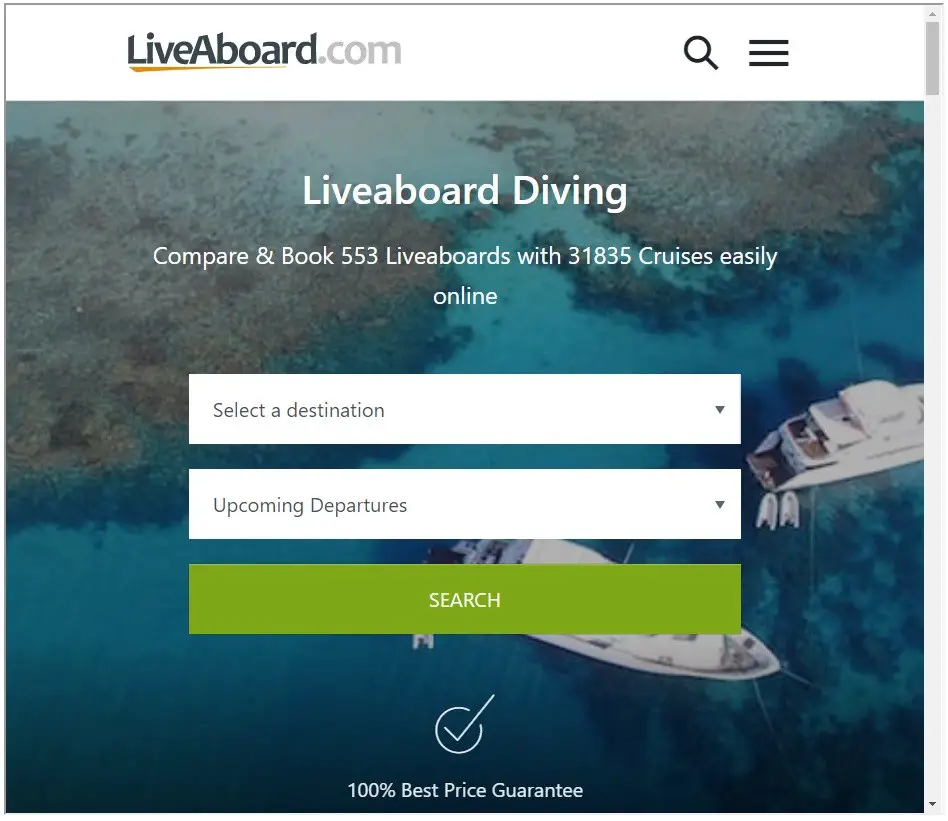
Do your ears hurt while scuba diving?
Your ears can hurt when you scuba dive but they shouldn’t and if they do it means you haven’t equalised the airspace in your inner ear on your descent properly.
You may have experienced ear-squeeze when you’ve dived underwater either in a swimming pool or in the sea. This is a question asked by many who snorkel and who are thinking about learning to scuba dive.
The other time you may have experienced ear-squeeze is when you fly. When you first take-off and ascend you’ll find your ears will ‘pop’. This is due to the reducing pressure as the plane gains altitude.
The reverse happens when the plane starts its descent. If you don’t equalise your ears you will suffer some discomfort. This is similar to scuba diving, but the pressure changes underwater are far greater than they are on land in air.
Equalising using the Valsalva Manoeuvre
This ear-squeeze is due to the effect of the increased pressure underwater. To equalise your ears when you go underwater is a achieved easily by using the The Valsalva Manoeuvre.
This where you squeeze your nose with your thumb and fingers and gently force air down your nose. The effect is to open your Eustachian Tubes to enable the air to equalise.
When you dive, it’s important to equalise your ears as soon as you commence your descent. If you don’t and you continue to dive deeper, your ears will get painful and you would risk rupturing your ear drums.
You should never scuba dive if you have a cold or congestion. This is because when you have a cold your Eustachian Tubes can get blocked. This makes it difficult to equalise your ears.
Can you scuba dive without being certified?
Yes in theory you could, and whilst it’s not illegal to dive without certification, you must not scuba dive without getting certified.
Scuba diving is classified as a dangerous sport. You may not realise it, but scuba diving is actually more dangerous than skydiving!
The odds of dying scuba diving are nearly three times that of the odds of dying skydiving!
So let me ask you a question: Would you consider skydiving without having an instructor showing you what to do? I imagine the answer to this question is a resounding no.
Therefore, if scuba diving presents a bigger risk than skydiving, don’t even consider diving without getting the appropriate instruction from a reputable training organisation like BSAC or PADI.
More Reading: PADI vs BSAC (Which diving qualification is better PADI or BSAC?)
Is scuba diving safe or is it dangerous to dive?
Despite explaining that scuba diving is more dangerous than skydiving. It is a very safe sport. But this depends on whether you follow all the safety diver training. But also, you’d be advised to read as many safety diving tips as you can.
Asking the question whether it’s dangerous to scuba dive is a good question to ask as it means you are taking it seriously. I’d be worried if you didn’t ask this question. By knowing the risks you will be more aware of the dangers and take the appropriate steps to avoid them.
- If you get trained properly.
- If you always dive in buddy pairs (i.e. never scuba dive alone).
- Make sure you check your air on a regular basis.
- Never dive beyond your experience and training.
- Never hold your breath (especially on an ascent from depth).
Follow the above basic rules and you will be fine and safe scuba diving.
More Reading: What should you not do after scuba diving (11 must NOT do’s after diving)
Can you dive alone with PADI Open Water or with BSAC Ocean Diver?
You should never scuba dive alone. This means no matter what your level of scuba diving certification (Open Water, Ocean Diver, Sport Diver, Advanced Open Water Diver and beyond), you should always dive using the buddy diving system. Buddy diving means you dive in pairs.
This is so that should anything go wrong with your diving equipment your buddy will be there to come to your rescue.
More Reading: How do I get a dive buddy? (5 easy ways to find a dive buddy)
Can you scuba dive with a heart condition?
Whilst I’m not a doctor or medical practitioner, I know that if you have any concerns with your heart of if you have a heart condition you MUST consult your doctor before you dive.
Also, if you have any chest pain or if you are experiencing lightheadedness or breathlessness during exercise, you should NOT dive.
All of the known cardiac conditions, which include high blood pressure, heart murmurs and abnormal heartbeats, hole in the heart (ventricular septal defect) should be evaluated by a doctor who understands scuba diving.
How to get certified to scuba dive and how long does it take?
To get certified to scuba dive you first need to decide on where you want to learn. Many people decide to get certified whilst they are on holiday. This is probably one of the best ways to get your scuba diving qualification.
For example, you could travel to the Caribbean. This might be to the Bahamas or one of the many other islands. Some of the best places to scuba dive as a beginner include destinations like the Red Sea, Bonaire, The Great Barrier Reef, Barbados, Antigua, The Cayman Islands and if you already live in the USA, The Florida Keys.
The basics of scuba diving taught by all of the diving schools is similar. However, BSAC focus more on diver safety and rescue at the outset. Whereas PADI don’t do this until further into your training as a separate course.
BSAC training vs PADI training
As a BSAC certified diver I am perhaps biased. But I consider BSAC training is the best in the world. Certainly, this is my experience and is what I find wherever I’ve dive around the world. I gain much higher respect and I’m often given more responsibility than other divers on trips.
However, having said this it’s not as easy to find BSAC training schools outside of the UK. It’s far easier to find PADI training centres in most places around the world. Also, I’m not saying that PADI isn’t good training, I just prefer the additional safety training aspects of BSAC which are taught from the outset.
Put it this way, would you prefer to be scuba diving with a buddy who knows how to rescue you if something goes wrong? Alternatively, would you prefer to dive with someone who has yet to learn this skill as they’ve not yet paid for this part of the training?
Where can I learn to dive?
The world is your oyster when it comes to learning to scuba dive. You can take your pick and it depends. You may be able to learn to scuba dive near where you live. But if you live near cold waters you may prefer to travel to somewhere warm to learn.
If you already live in warmer climbs and if you live near to the coast, then you are pretty much sorted.
However, if you live in a more temperate or cold climate, or if your live far away from the sea or coast, this may make it more challenging to learn to scuba dive. This is especially true if you don’t fancy diving in cold waters.
It would mean a trip to somewhere warm so you can learn to dive in warm tropical waters instead. But of course this will cost extra with your trip.
Is scuba diving expensive and how much does it cost to get scuba certified?
As with most sports, scuba diving isn’t cheap. In fact because the scuba diving equipment is designed for marine purposes (i.e. to withstand salt water) the equipment is expensive.
To get certified isn’t too expensive, probably between $200-300 depending on where you train. However, if you factor in the cost of a trip if you decide to get certified overseas, this will add to the cost. But if you were going to go on holiday or vacation in any event, then this isn’t really a cost of diving.
In addition to the cost of your equipment (if you choose to buy your own equipment that is), together with the certification costs, then there’s the cost to go diving. This isn’t cheap, as mostly this involves going on a boat to dive.
Unless you go somewhere like Bonaire. Where Bonaire has been voted the best shore diving location on the planet!
But if you were to compare scuba diving with other sports, like sailing or skydiving or windsurfing, then it’s not that expensive in comparison.
How long can you scuba dive for?
How long you can scuba dive for is governed by the depth you dive to and on how long your air will last.
The physics of scuba diving causes an effect on your body as you go deeper. For example, the deeper you go and the longer you stay at depth, the more nitrogen builds up in your body.
It is the dissolved nitrogen gasses that cause decompression sickness when a diver comes up too fast. This puts a limit on how long you can stay at certain depths, but in particular on deeper dives, which is anything beyond around 10-20 metres (33-66 feet).
Also, the deeper you dive, the faster you consume air from your scuba tanks.
More Reading: What are scuba tanks made out of (Steel vs aluminium scuba tanks)
For the average beginner scuba diver, the air consumption in calm waters at a shallow depth of around 10 metres (33 feet) could last up to one hour. However, as you progress to deeper depths like to 40+ metres (131+ feet), you will use up the air in your dive tank much faster.
There are a number of techniques and tips on how to conserve your air. This is important and something you’ll learn as you progress with your diving, as you’ll want to extend your dive time to as long as possible.
In the beginning however, your air consumption will be higher due to being anxious and through wasted air when trying to maintain neutral buoyancy.
How deep can I dive with PADI Open Water?
With the PADI Open Water Qualification (or the Ocean Diver qualification with BSAC) you can dive to 18 metres (59 feet). Although for BSAC Ocean Diver this is a depth of 20 metres (66 feet) instead.
How do you breathe while scuba diving?
To breathe when you’re scuba diving you use an aqualung. The mouthpiece or regulator is what you put in your mouth to breathe from. The regulator or mouthpiece is connected by a high pressure hose to a dive tank.
This dive tank is full of compressed air, which is usually compressed atmospheric air. Normally the air you breathe scuba diving is the same as you are breathing as you read this article.
More Reading: Do empty scuba tanks float? (This depends on the material they are made from)
There are also some more specialised types of air-mixes. Different air mixes can be used to extend your range and dive time. This can include increasing the oxygen mix by using nitrox.
Is it dangerous to hold your breath underwater?
One of the most important rules in scuba diving is to never ever hold your breath scuba diving. Holding your breath when you dive underwater in a swimming pool or when you are snorkeling is totally different to when you’re scuba diving.
This is one of the most important rules that will be taught to you when you begin your diver training.
Why can’t you go straight up when diving?
You can go straight up when you are diving, but at the end of a dive you must ascend to the surface using a slow controlled ascent. Also, always carry out a safety stop at between 5-6 metres (16-19 feet).
The deeper you dive and the longer you stay at depth, your body dissolves more and more nitrogen. It is this dissolved nitrogen which is what prevents you from being able to come straight up to the surface. If you did come straight up without using a slow controlled ascent you could potentially get decompression sickness or the bends.
Decompression sickness is cause by the formation of nitrogen bubbles as the pressure reduces. Depending on how many bubbles and where they form will depend on how serious the decompression sickness will be.
Why is it dangerous for a diver to take a hot shower?
The reason why divers shouldn’t take hot showers immediately after diving is the same reason why they also shouldn’t fly within 24 hours after diving.
After a deep dive you will still have nitrogen dissolved in your body tissues. When you take a hot shower, the temperature will increase the volume of these air bubbles, which in turn could cause decompression illness.
Can a scuba tank explode?
Scuba dive tanks are essentially metal cartridges filled with compressed air. Generally the pressure of the air in a dive tank when full is around 200 bar (2,900 PSI).
To prevent the air from escaping there is a valve at the top, which is what the high pressure hose attaches to which connect to your mouthpiece.
With that said and using the basics of physics, anything that is under pressure has the potential to explode.
When we were diver training we were taught to make sure our dive tanks were always laid on their side and secured properly to avoid them falling and causing a potential explosion.
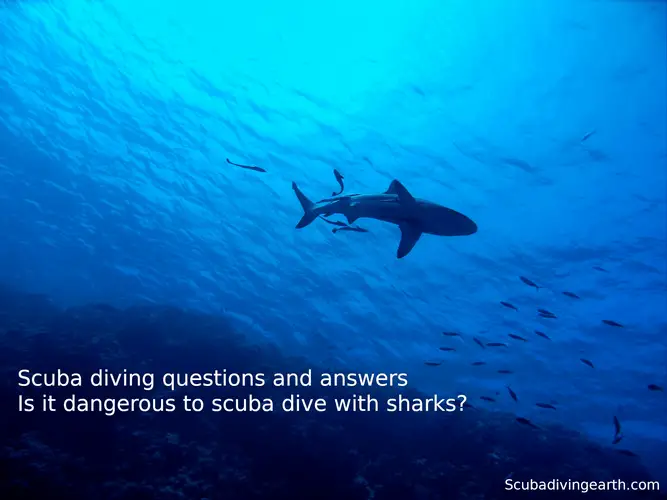
Is it dangerous to scuba dive with sharks?
Many non-divers and beginner scuba divers (plus more experience divers for that matter) still asked whether it’s dangerous to scuba dive with sharks. There are around 400 species of shark in our oceans. Many of which are totally harmless to humans and are totally safe to dive with.
There are a few more aggressive sharks. These include great white sharks, tiger sharks, bull sharks and oceanic whitetip sharks.
However, having said that, it is extremely rare for sharks to attack scuba divers unless they are being provoked. Sharks in general don’t attack scuba divers.
In 2018 there were a total of 130 shark attacks worldwide. Of these there were 66 unprovoked shark attacks. From these 66 shark attacks there were 4 fatalities.
The average percentage of shark attacks that involve scuba divers is around 5%. Which means that of the 4 deaths this is less than one. But it’s highly unlikely that any of these four deaths were actually scuba divers. But of the 66 total unprovoked attacks, possibly 3-4 of those were scuba divers.
Worldwide shark attacks is extremely low
The worldwide total number of unprovoked shark attacks is extremely low given the number of people participating in aquatic recreation each year. The number of attacks are decreasing, which is sadly partly to do with the decline in shark numbers.
To put things into perspective, on average, there are only around six fatalities on average attributable to unprovoked shark attacks worldwide each year. But by contrast, fisheries kill about 100 million sharks and rays annually!
Did you know Bill Gates says you should be more worried about mosquitoes than any other animal on the planet!

What is there to see when you go scuba diving?
This is a huge question and deserves a huge answer. But it does depend on what you like to see.
I personally love to see large underwater sea creatures. This includes sea turtles, sharks, but in particular whale sharks. But I also love little cute sea creatures like seahorses and boxfish too.
If you are also a lover of animals scuba diving will be amazing for you. When you dive for your first time on a coral reef you’ll be amazed at the beautiful colours and huge numbers of fish-life you’ll see.
Other scuba divers love to scuba dive on wrecks. These are great places to spot wild life too, as they create underwater colonies for fish and other creatures to live.
I hope you enjoyed this article about scuba diving questions and answers
I’d love to hear from you. Tell us about your adventures of diving and snorkeling, in the comments below. Please also share your photos. Either from your underwater cameras or videos from your waterproof Gopro’s!
If this article hasn’t answered all of your questions. If you have more questions either about snorkeling or scuba diving (or specifically about Scuba diving questions and answers), please comment below with your questions.
There will also be many more articles about scuba diving (and snorkeling) for you to read and learn about these fabulous sports.
Have fun and be safe!

